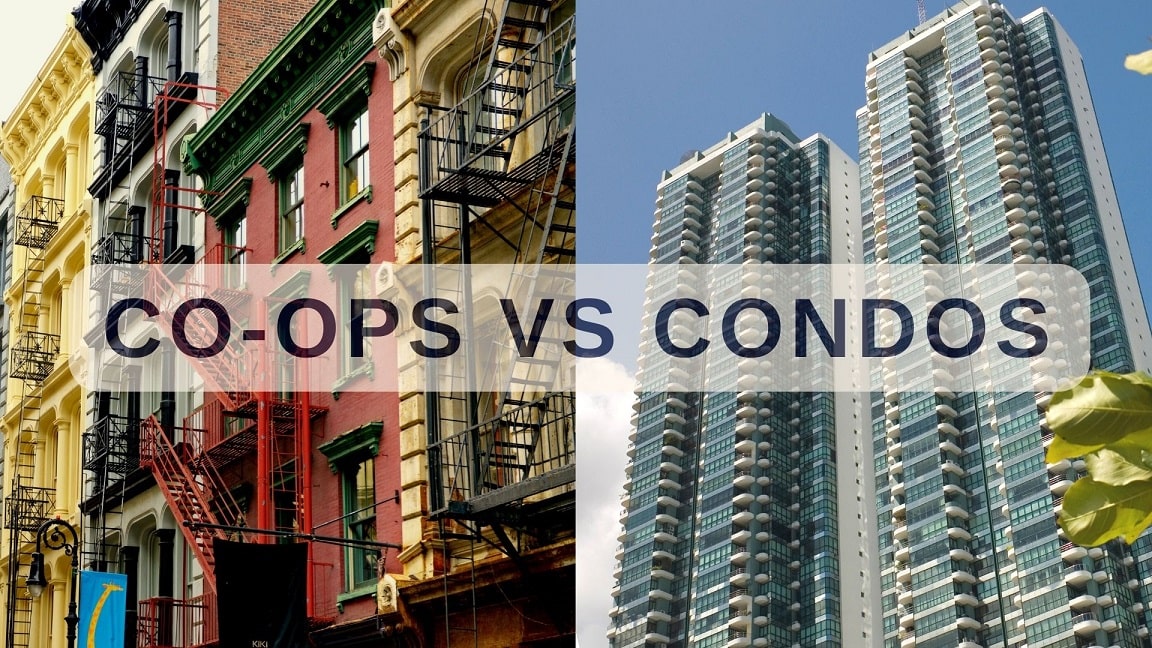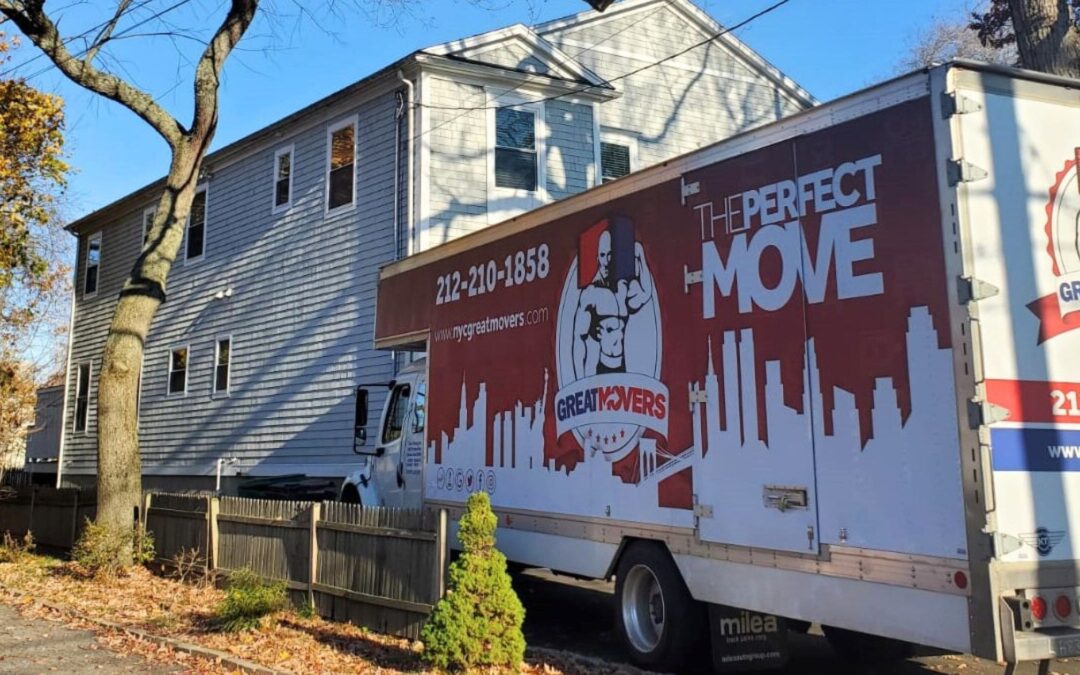Around 68 percent of the NYC population is renters, but that means around 32 percent are homeowners. Of course, being a homeowner in NYC is different from other locations; instead of owning a house, you are buying an apartment. Heck, even ‘buying’ isn’t quite right as the majority of apartments in NYC are co-ops instead of condos, though more condos are on the active market at any given moment.
If you’re lucky enough to have the money to own an apartment in NYC. However, before taking the plunge, it’s important to know the differences between a co-op and a condo. As you start sorting out the pros and cons of each option, you might wonder why condos are more expensive than co-ops and what a co-op actually is. Luckily, we’ll walk you through these questions so you can make an informed decision when buying.
What’s the Difference Between a Condo and a Co-Op?
If you’ve only been a renter in NYC, then these terms might be interchangeable. After all, you’re just paying the rent for an apartment, so it doesn’t really matter whether the building is labeled as a condo or co-op. However, once you get into the buying market, it makes a big difference. On the surface, a condo and a co-op might seem similar. The residents live in separate units and often have shared areas such as a pool, recreation center, laundry room, or playground. The key difference between a condo and a co-op is the ownership structure.
Buying a condo is similar to buying a house. You own the unit and a percentage of the common areas. Some condos require you to pay a bit more if you want the use of the more ‘exclusive’ areas. Since you own the unit, you have a lot more flexibility when it comes to decorating your new space, and you don’t have to deal with strict rules or leasing restrictions.
When you buy a co-op, you’re buying a share of the property, and your lease allows you to live in a unit. The larger your apartment, the more shares you will receive. So while you technically don’t own the property, you do get a say in how the co-op is run. Co-ops tend to have much stricter rules, and even if you have the money, the board will need to approve your application. Unlike condos, the co-op board can also evict you for anything they deem objectionable conduct.
Now that you know the basic difference between condos and co-ops, let’s dive into the pros and cons of each.
Pros of Buying a Condo
One of the biggest benefits of buying a condo is that you are buying actual real estate. Since you own your unit, you aren’t subject to approval by the condo board or restrictive rules. So long as you have the cash and a good credit score, you can purchase any condo on the market. Once you’ve signed the purchasing agreement, you’re free to do whatever you want with it – within reason, of course! Many condos might disallow any rentals of less than 30 days. Some might even frown upon shorter-term rentals under a year. You’ll need to read the condo house rules and declarations so you’re not blindsided by surprises.
While condos aren’t cheap, you can save a bit of money. Down payments tend to be lower than co-ops, with some as low as 3 percent down. It’s also easier to get loans for a condo as you’re owning real property, unlike co-ops. If you default, the mortgage lender has real property to deal with. In a similar vein, it’s much easier to sell a condo if you decide you no longer want to live in NYC. Condos are attractive to foreign and local investors as they can turn these units into expensive rental properties.
Average Purchase Price
| Property Type | Borough | Average Price (2023) | Price per Sq. Ft. | Notes |
|---|---|---|---|---|
| Co-op | Manhattan | $1.32 million | $1,026 | Older buildings, stricter regulations. |
| Condo | Manhattan | $1.80 million | $1,795 | Newer, modern amenities, fewer restrictions. |
| Co-op | Brooklyn | $670,705 | – | More affordable, larger spaces. |
| Condo | Brooklyn | $1.28 million | – | Newer buildings, higher price per unit. |
| Co-op | Queens | – | – | Generally offers more space for the price. |
| Condo | Queens | – | – | Newer but higher price. |
Since many condos tend to be on the newer side, you’ll get a lot of luxury amenities such as fitness centers, spas, pools, concierge services, beautiful rooftop access, and so on. Sure, you pay for these amenities every month, but for many, it’s worth it to have everything under one roof. Many high-end condos even have monthly events for their residents to mingle while enjoying delicious food and great live music.
Cons of Buying a Condo
The biggest downside of buying a condo is the price. Condos tend to be significantly more expensive than co-ops. Sure, you might not have to put a large down payment and could get loans, but are you willing to pay 2-3 times more for your apartment? Plus, you have to worry about high closing fees with condos, including title insurance, realtor/broker commission, and more.
Speaking of fees, you’ll have some ongoing fees you’ll need to pay besides your mortgage. Most condos require their residents to pay a maintenance fee for being a part of the condo association. This can vary dramatically depending on what the condo offers in terms of amenities and services. For example, a high-rise with a gym and doorman might have higher HOA fees than a small walk-up. On top of this, you’ll also have to pay utilities and taxes on your unit’s assessed value.
Pros of Buying a Co-op
You can find condos for sale in every major city in the US, and that includes New York City. While more luxury apartments and condos are being developed in NYC, co-ops still outnumber condos by a significant amount. In fact, some estimates suggest that around 75 percent of residential buildings in New York City are co-ops, with many in less developed neighborhoods. If you’re in the market for a home, you’ll definitely have more luck keeping an eye out for condos and co-ops than those just looking for condos.
Perhaps the biggest benefit of purchasing a co-op is its lower price tag. Many co-op apartments are in large pre-war apartments, so you’re getting a lot more space for less money. You also don’t have to deal with high closing costs, such as insurance or mortgage tax. As with condos, you do have to pay maintenance fees for the upkeep of shared facilities, and these can vary based on what the co-op decides to include in said fees. In many cases, the fees can seem excessive. However, many co-ops bundle utilities and a percentage of the building’s property tax, which is calculated based on how many shares of the co-op you own. So if you own a smaller unit, you will have a lower fee.
| Aspect | Pros | Cons |
|---|---|---|
| Ownership | Purchase shares of the building, lower price than condos. | You don’t own the unit outright, only shares. |
| Cost | Lower purchase price, lower closing costs, often more space. | High down payment required (20%-50% in some cases). |
| Fees | Maintenance fees may include utilities and property tax share, often lower than condos. | Fees can vary and sometimes seem excessive depending on the building. |
| Board Approval | Ensures a stable, long-term community with good neighbors. | The approval process can be grueling; rejection is possible for any reason. |
| Rules & Regulations | Discourages flipping and short-term rentals, maintaining a residential environment. | Strict regulations on pets, subletting, and reselling; limited flexibility. |
| Amenities | Generally enough for daily needs (doorman, shared laundry). | Fewer luxury amenities compared to condos (gyms, rooftop bars, concierge). |
Co-ops are truly meant to be homes, so the board puts a lot of stipulations in place to discourage foreign and local investors from turning units into rentals or flipping the apartments for a profit. If you’ve got good neighbors, you can rest easy knowing you don’t have to deal with a revolving door of tenants, never knowing if the next person who moves in will be a chain smoker or up at all hours of the night.
Cons of Buying a Co-op
As mentioned earlier, when you buy a co-op, you don’t actually own the unit. You’re purchasing shares of the building from a corporation. While you do still get a say in how the co-op is run, those with larger shares tend to have more influence. Unlike condos, you need to go through a grueling approval process that includes an in-person interview with the co-op board. Even after you go through all the steps, you could still be rejected for any reason. If you do get approved, be ready to put down at least 20 percent of the purchase price, with some co-ops requiring up to 50 percent.
Even when you get approved, you still have to follow the strict regulations of the co-op. Some typical regulations include:
- Pets – not all co-ops allow pets, so check with the board to see the policy. Those that do allow pets might limit how many you can have and charge a deposit, and a monthly pet fee
- Subletting – most co-ops require owners to live in an apartment for a certain amount of time before they can rent it out, while others don’t allow subletting at all. When subletting is permitted, there’s usually a time limit for how long you can rent it out within a five-year time frame
- Reselling – co-ops are long-term investments, so if you’re looking for a quick buck, then it’s not for you. To discourage flipping, co-ops charge a flip ‘tax’ that can cost up to 3 percent of the resale price.
Finally, while you might get a bit more space for the amount of money you spend, you’re also missing out on a lot of amenities. Most condos are new developments that have planned spaces for fitness centers, rooftop bars, etc. Co-ops tend to be on the older side, and while some have retrofitted basic amenities, they can’t compare to buildings that have been designed with these features in mind. In fact, many co-ops offer the bare minimum, such as a doorman or shared laundry room.
Should You Buy a Condo or Co-op
So which is better? It ultimately comes down to your personal decision. If you’re looking for something more long-term and want a bit more space, then co-ops might be the way to go. However, if you need to take out a loan and want to sublet your apartment quickly, then you might want to opt for a condo. Whatever your decision, make sure you have enough money saved up to account for the down payment, closing costs, etc., of whatever option you choose.
FAQ
Do co-ops and condos need a certificate of insurance when I move in?
While not all buildings require a certificate of insurance, chances are a condo and/or co-op will ask for one as they want to make sure the building is protected in case of damage during a move. Luckily, NYC Great Movers has all the necessary insurance requirements. You’ll need to contact building management and let us know about the COI requirements, and we’ll keep the ball rolling.
What is the moving process for a condo vs. a co-op?
Most will require you to reserve a time slot during the day or weekend to move. If there’s a freight elevator, you will also need to reserve it for the length of the move. Many buildings will only let you reserve the freight elevator once they have received the certificate of insurance.
How far in advance should I book my movers?
In general, you should book your movers at least a month in advance, though many will provide last-minute moving service,s though it isn’t always guaranteed








